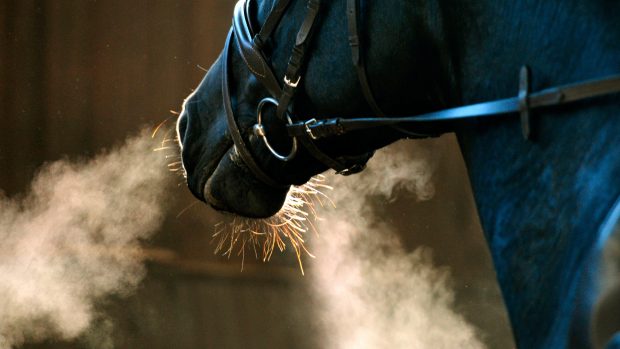In the worst cases of breathing difficulties, the affected horse will be perpetually breathless and/or coughing. His breathing will be laboured with heaving chest and flared nostrils.
In mild cases, they may just cough occasionally and have less stamina.
These symptoms develop as a result of an allergic response to organic dusts, particularly hay and straw dust and the fungal spores therein. If a sensitised horse is exposed to large amounts of an allergen, he will start to wheeze, cough and have difficulty in breathing.
In Britain, breathing problems are usually associated with a dust allergy. Conditions such as pneumonia are rare. Horses with Recurrent Airway Obstruction (RAO) suffer in the same way that people with asthma have allergies that make them breathless and wheezy.
General breathing difficulties can be due to either problems with the lungs (not taking on board enough oxygen), or an obstruction in the airways (preventing air getting in or out of the lungs).
If the lungs are involved, the horse may be wheezing, coughing or breathing rapidly and may sometimes have a sticky white or yellow discharge from the nose. If a blockage is suspected somewhere in the airway, the horse may make a loud respiratory noise that sounds as though he is roaring or snoring.
What to do
- Place the horse in a dust-free space, such as a paddock. Keep him quiet and under close observation. Exercise can make breathlessness worse, so do not make him move unnecessarily.
- Check the horse’s temperature for fever. This is unlikely but, if he has one, it suggests an infection. Contact your vet immediately.
- If the horse is breathless and gasping, and this does not improve within an hour, call your vet, particularly if the condition has come on rapidly.
- If there is severe coughing, the horse may have something stuck in his airways or gullet.
- If the horse has recently suffered a chest injury, call your vet at once.
- If there is a loud snoring or roaring sound all the time, call your vet. If this noise is only noticeable during exercise, it is not urgent, but do talk to your vet within a week.
This depends on the suspected cause. Medicines can be prescribed to help many breathing problems improve rapidly, but they may only control the symptoms temporarily rather than provide a cure. If there is an obstruction, the vet may perform a tracheostomy. In some cases, your vet may recommend an endoscopy, to examine the airways and lungs.
For practical help on what to do in an emergency, read First Aid for Horses by Karen Coumbe (JA Allen, £19.99).
| Click here to subscribe to HORSE magazine, which is packed with horsecare features every month |




